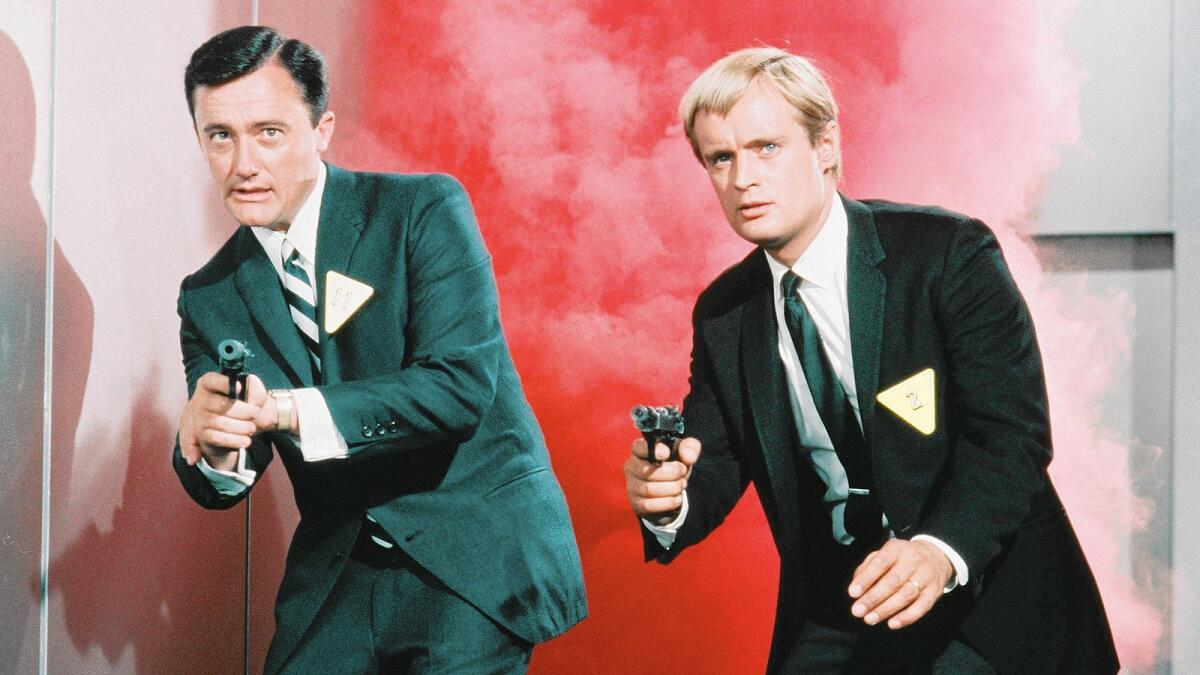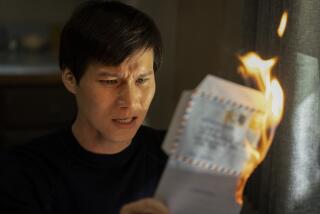Classic Hollywood: ‘Man From U.N.C.L.E’: The ‘Mad Men’ equivalent of the ‘Mad Men’ era

Robert Vaughn, left, as Napoleon Solo and David McCallum as Illya Kuryakin in the mid-1960s TV series “The ‘Man from U.N.C.L.E.”
When NBC aired its flashy, fun spy series “The Man From U.N.C.L.E.” 50 years ago, it made quite an impression on viewers.
The series, noted Steve Rubin, author of “The Complete James Bond Movie Encyclopedia,” was “appointment television. You had to be watching ‘Man from U.N.C.L.E.,’ like today you have to be watching ‘Game of Thrones.’”
The 1964-68 series starred suave Robert Vaughn as the womanizing American secret agent Napoleon Solo, David McCallum (“NCIS”) as his enigmatic partner, Russian Illya Kuryakin, and Leo G. Carroll as their boss, Alexander Waverly. The two men from U.N.C.L.E. (United Network Command for Law and Enforcement) would fight the nefarious villains of THRUSH, trade quips and romance the latest ingenue.
(The series currently airs on METV and the first season was released last week on DVD.)
FOR MORE CLASSIC HOLLYWOOD: Sign up for Susan King’s weekly newsletter
Young moviegoers checking out the feature film version Aug. 14 starring Henry Cavill as Solo and Armie Hammer as Kuryakin probably don’t realize the original TV series existed — let alone know of the show’s impact on baby boomers.
“Man From U.N.C.L.E.” hit at the right time. Noted Ron Simon, curator of television and radio at the Paley Center for Media in New York, “The same excitement seeing the Beatles live on television which happened a few months before, I think the same thing happened when ‘Man from U.N.C.L.E.’ debuted in fall 1964.
“There was something cool about it. It created an emotional resonance for TV. It became the most popular show on campus in 1964, ’65 and ’66 — the first two seasons. It was a cultural phenomenon.”
James Bond was already part of the pop cultural landscape. “Dr. No” and “From Russia With Love,” starring Sean Connery as 007, had opened to big box office in the U.S., with “Goldfinger” set for release in late ’64.
“Without James Bond’s success there would be no ‘Man From U.N.C.L.E.,’” said Rubin. “Every producer in Hollywood of note was developing a spy series drama or a comedy. Everything was spy-oriented.”
Bond author Ian Fleming was actually involved in the earliest days of the series. Executive producer Norman Felton approached Fleming to ask if he would create a spy series for him.
“He met Fleming in New York in a hotel,” said Emmy Award-winning producer-director-writer Dean Hargrove, a staff writer on the series’ second season. Fleming had begun writing about a character named Napoleon Solo who was going to be a CIA agent, noted Hargrove, who has directed a dance documentary called “Tap World” currently playing at the Nuart Theater.
Fleming’s participation in the series ended when Bond producers Harry Saltzman and Albert R. “Cubby” Broccoli got wind of what he was doing.
“Felton went and made a deal with [producer] Sam Rolfe, who was the real creator of the show,” said Hargrove. “He created the U.N.C.L.E. organization and put in the characters of Waverly and Kuryakin.”
Jerry Goldsmith was brought in to score the pilot and two other episodes. Though Goldsmith’s theme song remained throughout the series, the composing duties were “handed off to a series of composers including Lalo Schifrin” (“Mission: Impossible”), according to film music historian Jon Burlingame, who produced and annotated CDs of music from the show.
Vaughn and especially McCallum became overnight heartthrobs. “Every teen magazine had David McCallum on the cover,” said Rubin.
McCallum’s and Vaughn’s feature careers also flourished with both making movies during their hiatus from the series, including “The Venetian Affair,” “Sol Madrid” and “Three Bites of the Apple.” Several two-part episodes of the series were turned into feature films for release both here and abroad. And the show spawned novels, action figures and even a Kuryakin card game.
Ratings began going south when the humor in the third season became too broad and slapstick. The show also suffered that year when the highly publicized spinoff “The Girl From U.N.C.L.E.” was a critical and ratings disappointment. “It sort of cannibalized ‘U.N.C.L.E.’ a little bit,” noted Burlingame.
In the fourth season, “U.N.C.L.E.” returned to a more serious tone. But it was too little, too late. The series was replaced in January 1968 by “Rowan & Martin’s Laugh-In,” which went on to become a cultural phenomenon of its own.
Burlingame believes the spy show was appealing for a variety of reasons, including the political realities of the day.
“‘U.N.C.L.E.’ kind of painted an idealistic world where an American and a Russian could be working together — this was at the height of the Cold War — in an effort to combat criminal activities around the world,” said Burlingame who first became a fan of the series as a 12-year-old boy. “There was something idealistic and wonderful about that.
“Then you can’t discount the incredible chemistry between Vaughn and McCallum. I was just caught up in the appeal of the ideas, and let’s face it, they were really well-made shows.”
For more Classic Hollywood, follow us on Facebook and subscribe to the newsletter
More to Read
Only good movies
Get the Indie Focus newsletter, Mark Olsen's weekly guide to the world of cinema.
You may occasionally receive promotional content from the Los Angeles Times.







